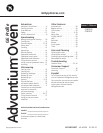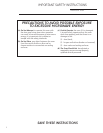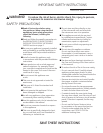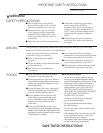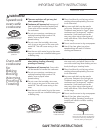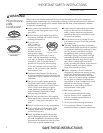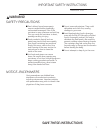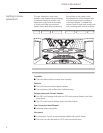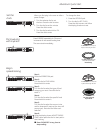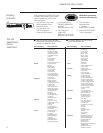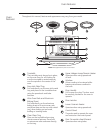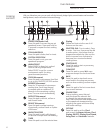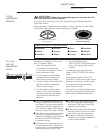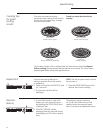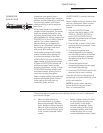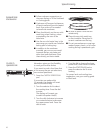
4
WARNING!
■ Do not operate the oven without
the turntable in place. The turntable
must be unrestricted so it can turn.
■ During and after use, do not touch,
or let clothing or other flammable
materials contact any interior area
of the oven; allow sufficient time for
cooling first.
■ Keep the oven free from grease buildup.
■ Cook meat and poultry thoroughly—
meat to at least an INTERNAL
temperature of 160°F, and poultry to
at least an INTERNAL temperature of
180°F. Cooking to these temperatures
usually protects against foodborne
illness.
■ Potentially hot surfaces include the
oven door, floor, walls, oven rack and
turntable.
SAFETY PRECAUTIONS
Arcing is the microwave term for sparks
in the oven. Arcing is caused by:
■ Metal or foil touching the side of
the oven.
■ Foil not molded to food (upturned edges
act like antennas).
■ Use foil only as recommended in
this manual.
■ Metal cookware used during either
speedcook or microwave cooking (except
for the pans provided with the oven).
■ Metal, such as twist-ties, poultry pins,
or gold-rimmed dishes, in the oven.
■ Recycled paper towels containing small
metal pieces being used in the oven.
ARCING
Arcing can occur during both speedcooking and microwave cooking. If you see arcing,
press the CLEAR/OFF pad and correct the problem.
Advantium Oven
IMPORTANT SAFETY INSTRUCTIONS
■ When microwaving, place all foods and
containers on the clear glass tray.
■ Do not pop popcorn in your oven unless in
a special microwave popcorn accessory or
unless you use popcorn labeled for use in
microwave ovens.
■ Do not boil eggs in this oven. Pressure will
build up inside egg yolk and will cause it
to burst, possibly resulting in injury.
■ Do not operate the oven without food
inside. This may cause damage to the
oven. It increases the heat around the
magnetron and can shorten the life
of the oven.
■ Foods with unbroken outer “skin” such
as potatoes, hot dogs, sausages, tomatoes,
apples, chicken livers and other giblets, and
egg yolks should be pierced to allow steam
to escape during cooking.
■ SUPERHEATED WATER
Liquids, such as water, coffee or tea, are
able to be overheated beyond the boiling
point without appearing to be boiling. Visible
bubbling or boiling when the container is
removed from the microwave oven is not
always present. THIS COULD RESULT IN
VERY HOT LIQUIDS SUDDENLY BOILING
OVER WHEN THE CONTAINER IS DISTURBED
OR A SPOON OR OTHER UTENSIL IS
INSERTED INTO THE LIQUID.
To reduce the risk of injury to persons:
— Do not overheat the liquid.
— Stir the liquid both before and halfway
through heating it.
— Do not use straight-sided containers with
narrow necks.
— After heating, allow the container to stand
in the microwave oven for a short time
before removing the container.
— Use extreme care when inserting a spoon
or other utensil into the container.
FOODS
SAVE THESE INSTRUCTIONS



